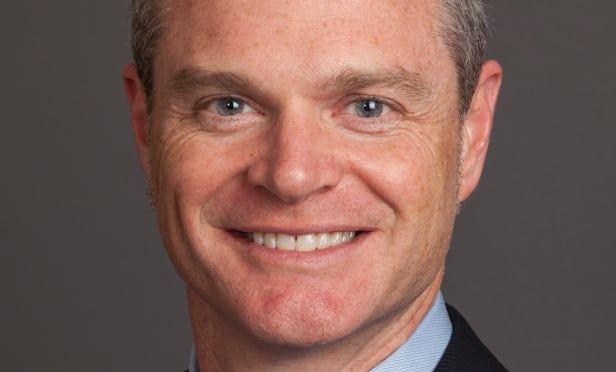 Fleming: “While it's not a large factor today, [the lockout effect] could become more significant as we approach, and/or exceed, 5% for the mortgage rate, which is not expected until late this year or early next.”IRVINE, CA—While not a large factor today, the lockout effect could become more significant as we approach and/or exceed a 5% mortgage rate, which is not expected until late this year or early next, First American Financial Corp.'s chief economist Mark Fleming tells GlobeSt.com. In his monthly Potential Home Sales model and analysis for December 20016, Fleming highlighted the impact of rising rates on market potential and prices. One of his comments was, “One thing to watch for in 2017 is evidence of a 'lockout effect,' where homeowners are hesitant to sell their home if their mortgage rate is lower than the current market rate.”
Fleming: “While it's not a large factor today, [the lockout effect] could become more significant as we approach, and/or exceed, 5% for the mortgage rate, which is not expected until late this year or early next.”IRVINE, CA—While not a large factor today, the lockout effect could become more significant as we approach and/or exceed a 5% mortgage rate, which is not expected until late this year or early next, First American Financial Corp.'s chief economist Mark Fleming tells GlobeSt.com. In his monthly Potential Home Sales model and analysis for December 20016, Fleming highlighted the impact of rising rates on market potential and prices. One of his comments was, “One thing to watch for in 2017 is evidence of a 'lockout effect,' where homeowners are hesitant to sell their home if their mortgage rate is lower than the current market rate.”
Fleming also noted, “The market potential for existing-home sales fell 3.1% between November and December due to the post-election rate increase, offsetting increased demand caused by the strength of the broader economy, particularly wage growth and improving access to credit. However, the market continues to underperform its potential due to the highly limited inventory. He added that the low inventory of homes for sale continues to be a concern, since it is “putting upward pressure on house prices and could counteract the downward price pressure caused by higher mortgage rates.”
We spoke with Fleming about the lockout effect and how much it will influence home-sales inventory as interest rates rise.
GlobeSt.com: How much of a factor do you believe a lockout effect will play in home-sales inventory as interest rates rise?
Fleming: While it's not a large factor today, it could become more significant as we approach, and/or exceed, 5% for the mortgage rate, which is not expected until late this year or early next.
GlobeSt.com: Some experts are noticing a divergence between the rise in interest rates and the rise in incomes, which is having a dampening effect on home sales. Are you noticing this as well?
Fleming: Interest rates have risen recently on financial-market preferences for bonds versus stocks, which are not tied to the real economy and income growth. We are seeing income growth because of improved economic conditions.
GlobeSt.com: What events or factors could boost inventory?
Fleming: More building. We have been underbidding relative to long run demand, so we will need to catch up at some point.
GlobeSt.com: What other trends in inventory are you noticing?
Fleming: I think the biggest reason for the lack of inventory is the matching trap. Existing homeowners are unwilling to sell because they don't see a lot of choices for what to buy.
 Fleming: “While it's not a large factor today, [the lockout effect] could become more significant as we approach, and/or exceed, 5% for the mortgage rate, which is not expected until late this year or early next.”IRVINE, CA—While not a large factor today, the lockout effect could become more significant as we approach and/or exceed a 5% mortgage rate, which is not expected until late this year or early next,
Fleming: “While it's not a large factor today, [the lockout effect] could become more significant as we approach, and/or exceed, 5% for the mortgage rate, which is not expected until late this year or early next.”IRVINE, CA—While not a large factor today, the lockout effect could become more significant as we approach and/or exceed a 5% mortgage rate, which is not expected until late this year or early next,
Fleming also noted, “The market potential for existing-home sales fell 3.1% between November and December due to the post-election rate increase, offsetting increased demand caused by the strength of the broader economy, particularly wage growth and improving access to credit. However, the market continues to underperform its potential due to the highly limited inventory. He added that the low inventory of homes for sale continues to be a concern, since it is “putting upward pressure on house prices and could counteract the downward price pressure caused by higher mortgage rates.”
We spoke with Fleming about the lockout effect and how much it will influence home-sales inventory as interest rates rise.
GlobeSt.com: How much of a factor do you believe a lockout effect will play in home-sales inventory as interest rates rise?
Fleming: While it's not a large factor today, it could become more significant as we approach, and/or exceed, 5% for the mortgage rate, which is not expected until late this year or early next.
GlobeSt.com: Some experts are noticing a divergence between the rise in interest rates and the rise in incomes, which is having a dampening effect on home sales. Are you noticing this as well?
Fleming: Interest rates have risen recently on financial-market preferences for bonds versus stocks, which are not tied to the real economy and income growth. We are seeing income growth because of improved economic conditions.
GlobeSt.com: What events or factors could boost inventory?
Fleming: More building. We have been underbidding relative to long run demand, so we will need to catch up at some point.
GlobeSt.com: What other trends in inventory are you noticing?
Fleming: I think the biggest reason for the lack of inventory is the matching trap. Existing homeowners are unwilling to sell because they don't see a lot of choices for what to buy.
Want to continue reading?
Become a Free ALM Digital Reader.
Once you are an ALM Digital Member, you’ll receive:
- Breaking commercial real estate news and analysis, on-site and via our newsletters and custom alerts
- Educational webcasts, white papers, and ebooks from industry thought leaders
- Critical coverage of the property casualty insurance and financial advisory markets on our other ALM sites, PropertyCasualty360 and ThinkAdvisor
Already have an account? Sign In Now
*May exclude premium content© 2024 ALM Global, LLC, All Rights Reserved. Request academic re-use from www.copyright.com. All other uses, submit a request to [email protected]. For more information visit Asset & Logo Licensing.








